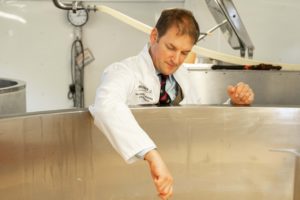Sales & Growth
Article
Productivity is getting more out of each day – and not busting a gut doing it

Chiltern Brewery’s Tom Jenkinson is taking a less is more approach to productivity, streamlining the business and sharing responsibility around the whole operation.
In 2005, Tom Jenkinson and his brother George took over the family brewery their parents founded in 1980 and set about simplifying an operation that had sprouted a few too many tentacles. “We were doing tours, we were doing own-label beers and while what we were doing was very good, it was extremely complicated for the small number of people who were working in the business,” explained Tom.
It wasn’t necessarily a radical cull – Chiltern thrives on innovation and still has multiple strings to its bow, including mini-casks for home delivery – but where once they had three or four options for a particular product, Tom was keen to reduce it to just one.
In addition to streamlining the business, Tom is committed to improving productivity. He said, “If we could brew 10,000 pints with five people last year, can we do it with four people this year by improving efficiencies – and not busting a gut doing it? Productivity to me is about getting more out of each day.”
What’s your approach to growth within the business, Tom?
“One of the main routes to growth is to develop the skills within the team so that the responsibility for growth is shared amongst the whole business rather than just concentrated on a couple of individuals. So that means everybody within the team is looking towards making efficiencies and growing the business.”
Can you give us a practical example?
“The team within the shop are trained to know how to handle trade customers if they get an inquiry. So, rather than saying, ‘I’ll speak to a manager and they’ll get back to you,’ which reduces the chance of conversion because of the potential for that link to break and the note not getting passed on, the team are trained to say: ‘Fine, here’s the details, and you’d be delivered to on Wednesday’. These sorts of things are perhaps not front-line concerns, but they all add inches to growth.”

Is product innovation important, too?
“Yes, and we are developing new things like canned and gluten-free beer. You’ve got to keep things fresh. We’re also developing what we call ‘partnerships’ with a number of pubs that are especially well aligned with our values. By developing beers that work for them, for example, we can create a deeper connection and longer-term relationship. So, we’re supporting them and building our own business in the process.”
How do you get the Chiltern team to really root for the business?
“The old style of a manager saying ‘This is what you do’ and the team then doing it is not the way we operate. Our way is to get the team suggesting ideas and then, if approved, to implement them individually on behalf of the team. Some people, of course, aren’t interested, and a lot of those who aren’t have moved on over the years. We want people who are keen to move the business in the direction we’re going.”
Do you have a specific leadership style?
“We’re trained in what’s called ‘situational leadership’, which is where you vary your feedback and your management style depending on the task at hand. You might have someone who’s completely fresh to the business or being trained to do something for the first time, and with them you would take on more of a directional style, saying, ‘This is what you need to do’. But someone who has been doing that for months or years, you’d take more of a delegating style.”
What have you got out of the Be the Business Masterclasses you’ve attended so far?
“They’ve been brilliant. I think it’s good to get out amongst like-minded people – it’s great to be amongst professionals who are looking to grow and to actively develop new things. That’s very exciting. Even if you just get one good idea from a masterclass, it’s good value, and I’ve come back with three or four ideas from it.”
Finally, what tip would you give to other business leaders about simplifying their proposition?
“One trick is to use the 80/20 rule which says that 80 per cent of your profit comes from 20 per cent of your customers. So, try and find those 20 per cent who generate that 80 per cent of profit, and if you can find them then you can really concentrate on them, spending less time overall with greater return. That’s probably one of the easiest ways to simplify things.”
Interested in attending a Be the Business Masterclass event? Find out what we have coming up.